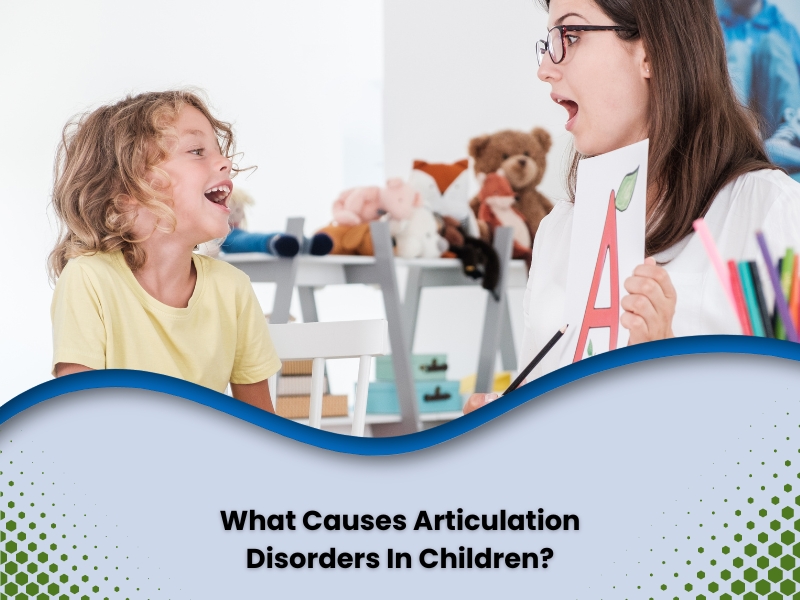As parents, you want the best for your children, including their communication ability. Articulation disorders are common among children and can affect their speech development. Understanding the causes of these disorders can help parents and healthcare professionals provide appropriate support and interventions.
What is an articulation disorder?
When a child has trouble pronouncing certain sounds correctly, it can make their speech hard to understand. These difficulties often involve how individual sounds are formed and range from mild to severe. Children may leave out, substitute, or distort, impacting their communication ability.
Speech and language development in children is a complex process that involves acquiring new sounds, words, and grammar rules. It’s normal for young children to make mistakes as they learn to speak, but if these problems continue beyond the expected age, it may indicate the need for additional support, such as speech therapy, to help them improve their speech skills.
What are the different types of articulation disorders?
Articulation disorders can manifest in various ways. Common types include:
- Substitution: This occurs when a child substitutes one sound for another, such as saying “wabbit” instead of “rabbit.”
- Omission: This is when a child omits certain sounds in words, such as saying “cu” instead of “cup.”
- Distortion: Distortion involves producing sounds unfamiliarly, which may result in a slushy or unclear sound.
- Addition: In this case, children may add an extra sound to a word, like saying “buhlue” instead of “blue.”
Each type of articulation disorder can make speech difficult to understand, potentially leading to frustration for the child and communication challenges in social settings.
What are some common articulation errors?
Articulation errors can vary widely from child to child, but there are several common patterns that speech therapists often observe. These include:
- Lisping: When a child produces the “s” and “z” sounds with a “th” sound.

- Difficulty with consonants: Many children have trouble with consonants such as “r,” “l,” “th,” or “sh.”
- Cluster reduction: This involves omitting one or more consonants in a consonant cluster, such as saying “pane” instead of “plane.”
- Final consonant deletion: Some children may drop the final consonant of a word, like saying ‘ca’ instead of ‘cat.
These articulation errors are expected in early speech development. Still, intervention may be necessary if they persist beyond the typical age range.
What factors can contribute to articulation disorders?
Several factors can contribute to the development of articulation disorders in children. These include:
- Hearing problems: Children who experience hearing loss or chronic ear infections may have difficulty learning to produce certain sounds correctly.
- Developmental delays: Some children with global or other disabilities may struggle with speech clarity.
- Oral-motor difficulties: Weakness or poor coordination in the muscles used for speaking can affect sound production.
- Family history: Speech issues can sometimes run in families, indicating a possible genetic influence on speech development.
- Neurological conditions: Children with conditions such as cerebral palsy or apraxia of speech may experience significant difficulties with articulation.
Understanding the contributing factors can help parents and professionals identify the need for early speech therapy intervention, which is critical in addressing these disorders.
What can be done to help children with articulation disorders?
If your child is diagnosed with an articulation disorder, several strategies can be used to support their speech development. These may include:
- Speech therapy: A trained speech therapist can work with your child to address specific articulation errors and improve communication skills. Therapists can help children develop precise speech patterns through targeted exercises and activities.

- Home practice: Encouraging your child to practice specific sounds or words at home can reinforce what they learn in therapy sessions. Regular practice can lead to greater consistency and confidence in their speech.
- Play-based therapy: Engaging in speech exercises through play can make learning more enjoyable for young children. This approach helps reduce anxiety and allows children to learn in a fun, interactive way.
- Parental involvement: Parents play a crucial role in supporting their child’s speech development by reinforcing correct articulation at home. Parents can create a supportive environment that encourages practice by actively participating in their child’s learning.
- Visual and auditory cues: Using pictures, gestures, and sound cues can help children understand how to produce certain sounds. These cues can provide additional context, making it easier for children to grasp complex speech concepts.
Each child’s treatment plan should be tailored to their unique needs, ensuring they receive the most effective support possible. By collaborating closely with therapists and incorporating these strategies, families can foster significant progress in their child’s speech development.
What role does speech therapy play in addressing articulation disorders?
Addressing articulation problems through speech therapy is one of the most effective ways to help children overcome their condition. Speech therapists are trained professionals who assess, diagnose, and treat communication disorders in children. When it comes to speech difficulties, therapy involves:
- Evaluate the child’s speech: A speech therapist will conduct an evaluation to identify which sounds the child is struggling with and the severity of the disorder. This comprehensive assessment helps pinpoint specific areas that need attention.
- Creating a tailored treatment plan: The therapist will develop an individualised plan to target specific articulation errors based on the assessment. This personalised approach ensures the child receives focused support that meets their unique needs.
- Engaging in therapy activities: The therapist will use games, exercises, and other engaging activities to help the child practice and improve their speech. These fun, interactive methods make learning enjoyable, encouraging consistent participation.
- Monitoring progress: Regular monitoring and adjustment of the therapy plan ensure that the child continues progressing. This ongoing evaluation allows the therapist to celebrate milestones and make necessary changes to enhance the effectiveness of the treatment.
Give your child the gift of clear speech
At Auburn Health Centre, we understand how challenging articulation disorders can be for children and their families. Our experienced speech therapists work with you to develop personalised treatment plans that target your child’s specific speech needs. With a compassionate approach and a commitment to delivering high-quality care, our goal is to help your child improve their communication skills and build confidence.
We offer flexible scheduling options and telehealth services for families who prefer online consultations. Our success stories highlight our positive impact on children’s lives, helping them overcome speech challenges and thrive in social and academic environments.
If you’re concerned about your child’s speech development, book a speech therapy appointment at Auburn Health Centre. Our team is here to support you.


